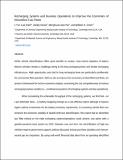| dc.contributor.author | Hsieh, I-Yun Lisa | |
| dc.contributor.author | Nunes, Ashley | |
| dc.contributor.author | Pan, Menghsuan Sam | |
| dc.contributor.author | Green Jr, William H | |
| dc.date.accessioned | 2020-03-06T18:41:34Z | |
| dc.date.available | 2020-03-06T18:41:34Z | |
| dc.date.issued | 2020-06 | |
| dc.date.submitted | 2020-02 | |
| dc.identifier.issn | 2210-6707 | |
| dc.identifier.uri | https://hdl.handle.net/1721.1/124023 | |
| dc.description.abstract | While vehicle electrification offers great benefits to society, mass-market adoption of battery electric vehicles remains a challenge owing to the long recharging times and limited recharging infrastructure. High opportunity costs tied to long recharging times are particularly problematic for commercial fleet operators. With an aim to improve the economics of electrified taxi fleets, we present a framework for techno-economic analysis, examining the cost competitiveness of various recharging business models (i.e., combined ecosystems of recharging systems and taxi operations).
When considering the achievable throughput of the recharging systems, we find that—on a per-kilometer basis—1) battery swapping emerges as a cost-effective option although it requires higher upfront investments for the battery inventory requirement; 2) increasing vehicle fleet size enhances the economic viability of double-shift taxi electrification. We expect that an electrified taxi fleet relying on the right recharging systems/operations could achieve cost parity with a gasoline-powered taxis system by 2022. Between now and then, the electrification of high-use vehicles requires government support; policies discussed include purchase subsidies and revenue-neutral gas tax imposition. By using real-world financial data taken from an operating electrified taxi fleet in Beijing, this paper provides a theoretical and practical reference for cities moving toward electric taxi ecosystems and sustainability. Keywords: Fleet electrification; Electric taxi; Recharging infrastructure; Battery swapping | en_US |
| dc.publisher | Elsevier BV | en_US |
| dc.relation.isversionof | http://dx.doi.org/10.1016/j.scs.2020.102119 | en_US |
| dc.rights | Creative Commons Attribution-NonCommercial-NoDerivs License | en_US |
| dc.rights.uri | http://creativecommons.org/licenses/by-nc-nd/4.0/ | en_US |
| dc.source | Prof. Green | en_US |
| dc.title | Recharging systems and business operations to improve the economics of electrified taxi fleets | en_US |
| dc.type | Article | en_US |
| dc.identifier.citation | Hsieh, I-Yun Lisa et al. "Recharging systems and business operations to improve the economics of electrified taxi fleets." Sustainable Cities and Society 57 (June 2020): 102119 | en_US |
| dc.contributor.department | Massachusetts Institute of Technology. Department of Chemical Engineering | en_US |
| dc.contributor.department | Massachusetts Institute of Technology. Department of Materials Science and Engineering | en_US |
| dc.relation.journal | Sustainable Cities and Society | en_US |
| dc.eprint.version | Original manuscript | en_US |
| dc.type.uri | http://purl.org/eprint/type/JournalArticle | en_US |
| eprint.status | http://purl.org/eprint/status/NonPeerReviewed | en_US |
| dspace.date.submission | 2020-03-04T13:02:44Z | |
| mit.journal.volume | 57 | en_US |
| mit.license | PUBLISHER_CC | |
| mit.metadata.status | Complete | |
